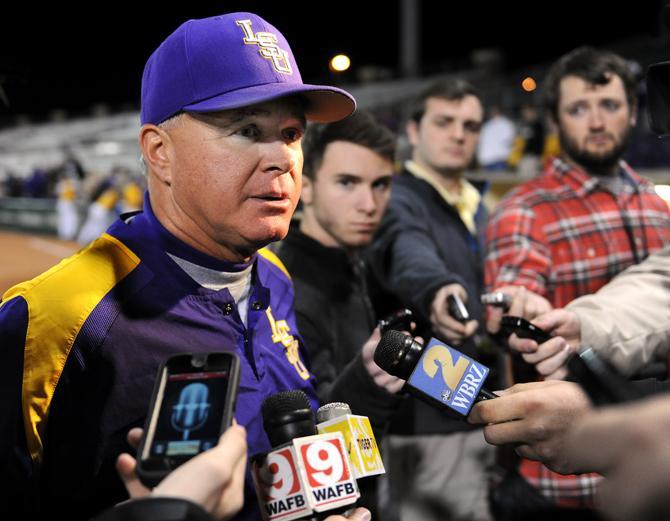LSU baseball coach Paul Mainieri made no bones about it.
“There are steroids in college baseball,” Mainieri said. “I’m pretty certain of it.”
While he didn’t name any specific programs or players, Mainieri said he’s noticed the trend develop as his 31-year coaching career has evolved, admittedly caught off guard by the newfound reliance on supplements and proteins.
Muscle Milk sponsors the LSU baseball team, according to strength and conditioning coach Jeremy Phillips, and those drinks coupled with other energy bars, fruits and vegetables are plenty enough to sustain the athletes and give them the energy they need on and off the field.
“There’s really nothing out there on the market that they could take, legally or illegally, that’s really going to help them that much,” Phillips said.
As Mainieri stood firm in his assertion that steroids are prevalent in the college game, his players took a slightly different tone, doubting steroids had reached the Division I level.
Both sophomore pitcher Aaron Nola and senior first baseman Mason Katz didn’t rule out the possibility that steroids are used, but said they had never associated with or met anyone who had taken them at the Division I level or while playing in summer leagues.
Summer leagues present a new challenge to Phillips, head trainer Jon Michelini and coordinator of sports nutrition Jamie Mascari, as they are unable to keep watch on players as the athletes scatter to different leagues, but remain under the NCAA’s random drug screening.
“I’ve known athletes who have gotten tested over the summer,” Michelini said. “They’ll be up at the Cape [Cod Summer League], and they’ll contact the individual randomly and do a test on-site.”
THE JUNIOR COLLEGE DILEMMA
In addition to faster players, stronger arms and stiffer all-around competition, juniors Sean McMullen and Christian Ibarra faced a new challenge off the field coming from their respective junior colleges.
“My school [Rio Hondo College] did not get tested at all,” Ibarra said.
McMullen said his time at Delgado Community College was exactly the same — no drug testing.
Junior colleges don’t fall under the same realm as NCAA, making their testing policies almost nonexistent and totally dependent on the school and what it can afford.
While both McMullen and Ibarra said they haven’t dabbled in performance-enhancing drugs, both consented it would have been much easier to cheat at their former schools and even questioned some teams they played against.
“You play some players just from some small towns, and you question,” McMullen said. “You can make your own judgments, but really that’s as far as it goes.”
Mainieri has seen the contrast firsthand, acknowledging that during his tenure at LSU he and his staff have recruited junior college players that weren’t the same once they arrived on campus.
Keeping his firm stance, Mainieri did not implicate anyone on the current LSU roster and attributed his past faults to simply being naive.
“In retrospect looking at it, I’m now a little smarter and would recognize that [the players I recruited] were doing something artificially to help them in junior college,” Mainieri said.
MAJOR LEAGUE INFLUENCE
Both former LSU first baseman Blake Dean and LSU pitching coach Alan Dunn have been there before.
Dean, who spent three years in the Dodgers’ farm system, rejoined the Tigers this season as an undergraduate assistant coach and said testing in college equals or outnumbers the farm system and MLB testing.
“I honestly think I probably got tested here, in a matter of four years, eight or nine times,” Dean said. “You get popped a lot. In pro ball, I was there for three years, and they did it about four or five times.”
Dean said catching cheaters is becoming increasingly difficult as the technology has led to keeping banned actions under wraps.
Dunn, who spent 22 years in professional organizations before becoming the Tiger pitching coach in 2011, questioned why anyone would want to risk the opportunity to play at such a young age, when most amateur athletes are focused solely on making a career of the game.
“I hope they look at it as keeping the game pure,” Dunn said. “Letting your abilities and letting what you do on the field take over and play the game with what God-given ability you have.”
Mainieri agreed with Dunn in saying the end of the season’s rewards taste even sweeter after it’s all done right.
“Not only are we going to not look for shortcuts, we’re going to intentionally do it the hard way,” Mainieri said. “Because when we hold that trophy over our heads, we want to know we did it the right way.”
This is the second part in a two-part series detailing steroids and steroid testing among LSU athletes.


